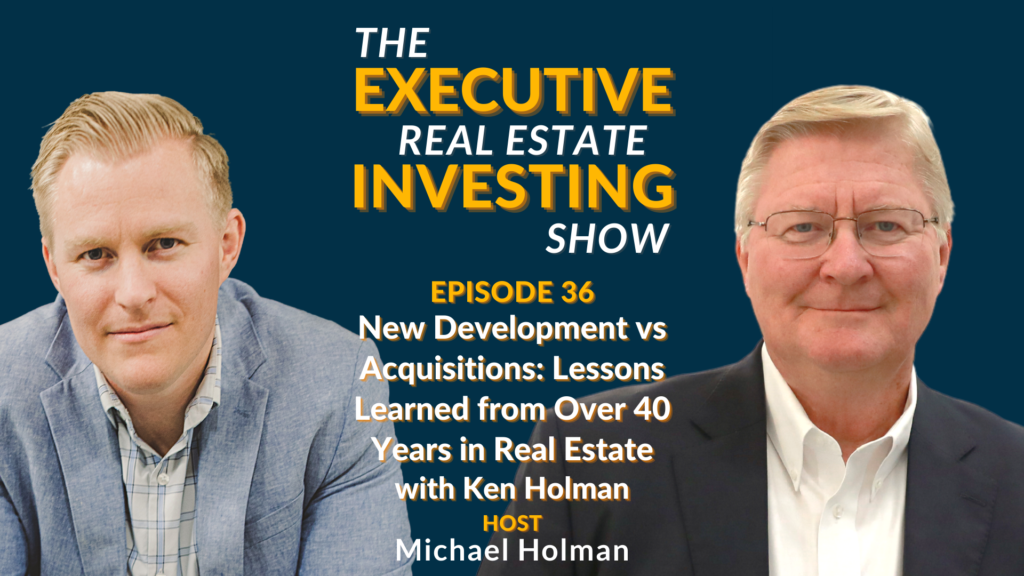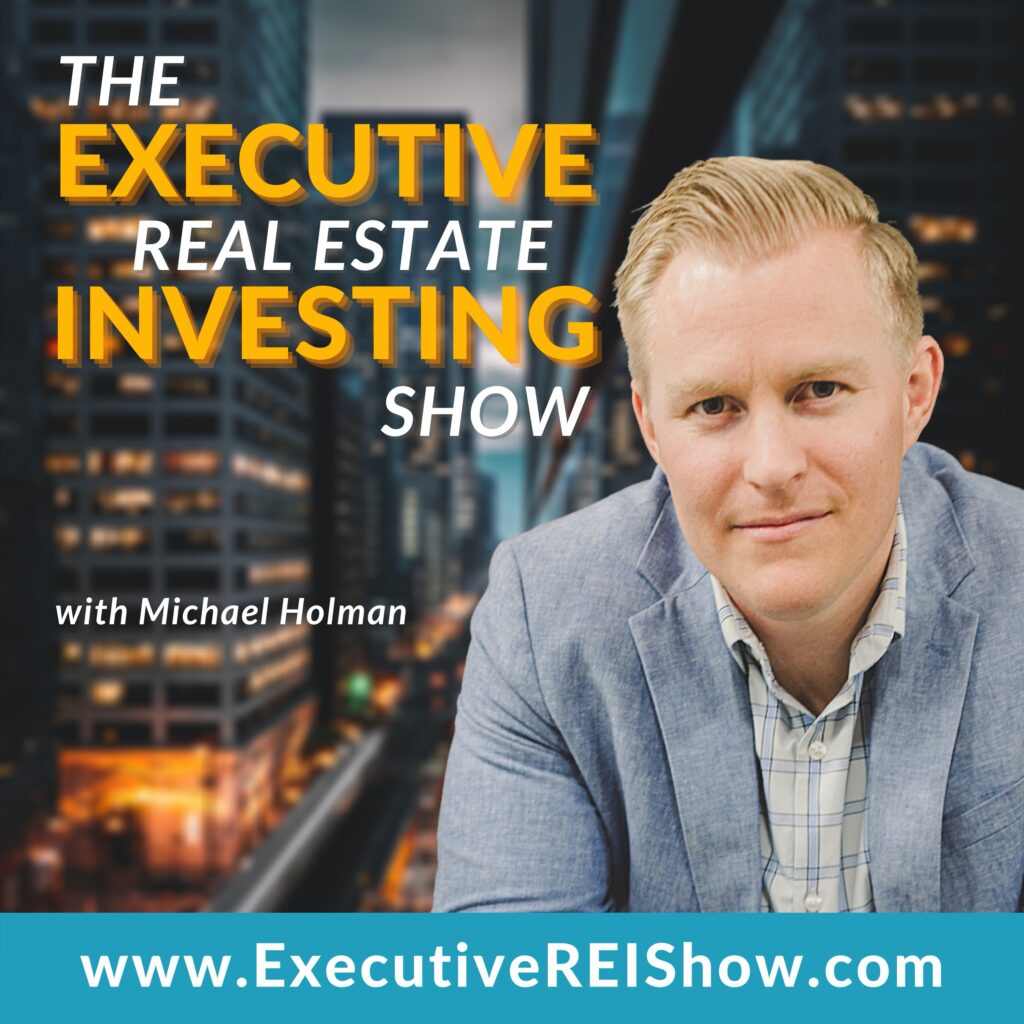
The executive Real estate investing Show
EPISODE 36
New Development vs Acquisitions: Lessons Learned from Over 40 Years in Real Estate with Ken Holman
- February 7, 2022
EPISODE SUMMARY
Like Father, Like Son: Michael Holman Interviews His Dad, Overland Group’s Ken Holman On the Advantages of New Development vs. Acquisitions.
With over 40 years of experience in real estate, from management, to acquisition, to development and construction—Ken Holman has had his share of failures and triumphs. He’s developed and constructed over 2,000 units, and his company, Overland Group, has another 834 in the works. Overland develops everything from apartments, hotels, industrial, storage, offices and retail properties–totaling nearly a billion dollars in real estate transactions. He’s also Michael’s dad!
Listen now as Ken talks about how he got started in Real Estate investing, and why he prefers new development over acquiring value-added properties.
EXECUTIVE TIP
Nothing Great Happens in a Short Period of Time
LISTEN TO THE PODCAST HERE

The Executive Real Estate Investing Show Podcast
EP 36: New Development vs Acquisitions: Lessons Learned from Over 40 Years in Real Estate with Ken Holman
Listen on
READ THE TRANSCRIPT HERE
Note: Audio transcription has been automatically transcribed
Welcome to The Executive Real Estate Investing Show. This podcast is for you, the busy business owner or executive looking to create generational wealth. Here, we’re going to show you how to do that through real estate investing from multifamily to industrial and everything in between. You will become a real estate investing expert. And now, here’s your host, Michael Holman.
Michael Holman: Hello, everyone, and welcome to another episode of The Executive Real Estate Investing Show your host, Michael Holman, we have a great guest with us today. Little sentimental, to be honest, it’s actually my father, Ken Holman, who’s on the show. He’s the one that started Overland Group, he has been in the Real Estate business for over 40 years. I just thought I have to get him on the show. I’ve actually been trying to get him on the show for I don’t even know how long but I’m really excited that today is the day that you all get to listen from him.
He has definitely been my biggest mentor throughout my Real Estate career, and to be quite honest, throughout my entire life. There are some things that he mentioned in this episode that are golden. I think things that probably only people with 40 plus years of experience in Real Estate could really understand and give. I highly, highly advise that you listen to this episode. I might even say you should listen to this episode twice, because the things that he says are just insightful.
You hear a lot of from a lot of different people. But people who’ve been in Real Estate for 40 years, they just think about Real Estate investing, they think about Real Estate differently than those of us that have been in there less than that. Somebody who’s been in Real Estate for three or four years versus 40 years. They talk, they think, they look at each scenario differently. You’re getting some of that insight. Love it, definitely check this one out.
Before we get started. If you have not been on the website yet, I don’t know how many times I got to tell you, but I am going to keep telling you, www.ExecutiveREIShow.com. Check it out. We would love to get your questions go ahead and ask an executive question we’ll get that answered on this show. You can also subscribe to the newsletter, get all that Real Estate information right in your email once a week. It’s fantastic. You can also go see all the previous episodes.
Check out the show notes, check out all the resources from those shows. If you have somebody you want to get in contact with guess what? One of the questions we ask every single guest at the end of the show is how can people contact you? And we put that right into the show notes. You can go there, you can get in touch with somebody, you thought, oh man, I got to go meet this person, I have to establish that relationship, I need to build my network. Great way to do it, go check out the show notes. www.ExecutiveREIShow.com
Also, go ahead and leave us a rating and review. Whether you’re listening on Google, Apple, Spotify, wherever it is, we would love to get your rating and review and see how we’re doing and potentially even how we can do better. So go ahead, leave us a rating super simple, super easy. Just click those stars button. And let’s go. So lastly, before we get into this episode, we have to start off with today’s executive tip.
Today’s executive tip is that nothing great happens in a short period of time. Nothing great happens in a short period of time. One of the things that I was thinking as we were going through this episode, as I was recording this with Ken. He’s been in this for 40 years, and you just have to be able to give yourself some time. A lot of us get in there and it’s like, in six months, we’re sitting there thinking, okay, if I’m not a kajillionaire in six months through Real Estate investing, I’ve done something wrong. I’m going to stop and I’m a complete failure and that’s not true. Regardless of what social media says, Real Estate is the long game.
It is a long haul and it’s building it consistently over 1,2 10, 20,40 years and that is how you become really successful in Real Estate investing and it’s true in a lot of other aspects. It’s true in your business. Sometimes people they start a new business, after three months, they spent $10,000 and they haven’t made one dime. They’re thinking I just need to give up on this. Sometimes Yeah, that is justified. But a lot of times and I would argue that most of the time.
It’s people just giving up too soon. They give up before they even give themselves a chance. Remember, nothing great happens in a short period of time. With that, we are going to get right into this interview with Ken Holman. Hello everyone and welcome to another episode of The Executive Real Estate Investing Show. As always, I’m your host, Michael Holman and today, we have a very, very special guest, he’ll probably be mad at me if I didn’t tell him he was the most important guest that I brought on this show. But it is, in fact, Ken Holman, he’s my father.
We’ve been doing business together for the last about five years almost by way of a little introduction to Ken. Ken is the president, owner, and founder of Overland Group, which is a vertically integrated Real Estate company. It comprises of Overland Capital, Overland Management, Overland Development, and Overland Construction. He’s also the president and founder of the National Association of Real Estate Advisors, or NAREA for short. That’s a program that trains Real Estate agents, how to understand commercial deals, how to analyze them, how to use the tools to analyze investments, really cool stuff. Lastly, but not least, he’s also developed hundreds of millions of dollars worth of Real Estate. Ken, welcome to the show.
Ken Holman: Thanks, Mike. No wonder I have so many wrinkles on my face. After that introduction, and I’ve seen and it has been both a good and a long, five years together. Trying to deal with the father son relationship is pretty cool. Especially when you’ve got a great son like you, but it’s been a lot of fun over the past few years.
Michael Holman: That’s hilarious, I often joke that I am the best and worst decision Ken ever made. Ken tell us a little about yourself, I gave you an introduction. But tell us about you.
Ken Holman: I graduated in accounting years ago, from BYU and got an MBA from the University of Utah and then later, I went to law school at the University of Idaho. I’ve had a pretty good career and really excited about the Real Estate business even after all these years, I think it was the right decision for me to get into the business. I started mainly working after I got my MBA, I got invited to work for a small, fairly sophisticated financial planning company that had a Real Estate syndication arm. Over the course of a few years, they asked me to head up the Real Estate side. Since then, I’ve been in Real Estate ever since. I started my own company after I’d been with them about five years and decided it was time to move out on my own because my interests and their interests were a little bit different, and I haven’t regretted the move. Forty years later, still feel good about it.
Michael Holman: 40 years. We’re gonna get into that in a little bit. But one of the things that I knew I had to ask you right from the beginning. There’re all these different companies. I list like six of them right at the beginning, five or six of them, Overland Construction, Overland Management, Overland Development, and on and on. What I want to know, and what I think a lot of people are interested in is, what was the progression of those companies? What did you start off doing and what was the goal of establishing and creating all those different companies?
Ken Holman: Initially, I started out when I got into career I created for this other company, a Real Estate management arm, and was overseeing the management of about 5000 units in five states. So getting my certified property manager designation and my Real Estate broker’s license, it was kind of a natural progression for me when I opened my own business to start in the management side. I knew where I wanted to be was investing so I began with a management company and then I thought, this is cool. I’m going to get in the investing side of the business.
Since I love land, the first deal I did was a land deal with a friend who had an industrial property and I went out and put a contract on a parcel of industrial land, borrowed $25,000 from my equity in my home, and I thought okay, this is gonna be a good investment, I talked to everybody I knew and within 90 days, I’d lost my 25 grand. My friend wouldn’t give it back and I thought, this is an interesting introduction to the business. I not only lost $25,000, I have $25,000 now on my home, I got to pay back. It was a $50,000 mistake and that’s the first time I realized that you have to really know what you’re doing when you’re getting in the Real Estate business.
My next investment happened to be an old apartment complex called the Avalon in downtown Salt Lake City. 36 rundown 1940s building that was totally vacant, and I rolled up my sleeves and renovated it, filled it up. Over the course of about 20 years, eventually I tore the building down and built a 12-storey high rise on it. 96 apartment units that we converted to condominiums. It turned out to be an extremely successful experience. I’ve learned a lot in the business, I made a few mistakes and I’ve had some really good winners along the way.
Michael Holman: Awesome. Talk to me, through this progression you went through some of the investments, you said you started with the management company, when did you decide to move to development or construction or some of these other aspects of Real Estate?
Ken Holman: I started with management and that involved brokerage. Those two aspects kind of go hand in hand, you need a broker’s license, to run a management company. In the early 1980s. We got to the point, and I had acquired some existing apartment complexes along the way. Then they changed in 1986, the Ronald Reagan in that area, they had the 1986 Tax Reform Act. When that occurred, it changed the whole dynamic of the Real Estate investing business. That’s when I started the development company and went out and my first development project was a little 420 units apartment development in Layton, Utah called Quail Cove. That’s where I started, and I had a small partner GE Capital at the time. It was a pretty good beginning. Then I thought I’m all for controlling as much of the Real Estate pipeline as I can. So over the years, I thought, all right, we’re doing some great projects.
I don’t know enough about the construction side, even though I grew up in the construction business. I got my general contractor’s license, we started a construction company, and that construction company has been the piece of the puzzle, that has been the most difficult part to get right. I think after 30 years of this, I think we’re finally starting to get it, where it needs to be doing what it should be doing for us and we’re not the typical construction company. We actually operate more like a construction management company where we do project management, project engineering, estimating, and superintending.
But we stop at that level, and we don’t try to sell perform any of the scopes and work within the project, we competitively bid that out. By doing that, it’s allowed us to go into several different markets and develop different types of projects. I love having our hand in the construction process. It’s made a huge difference in who we are and what we’re capable of doing and how we protect our investors capital to by the way.
Michael Holman: There’s like ten things that I want to unwrap there. But I want to go back to one of the questions I asked initially, which was, you’ve established all these different companies. It started with management; things changed with the 1986 Tax Reform Act. We had development also you had construction later. What was the end goal? What was the vision for all these different companies? Most people just look at it, they’ll probably get a successful management company, but it kind of stops there. It’s like, why go into something else, if it’s working. What was the end goal to getting all these different businesses?
Ken Holman: For me, it was twofold. The first aspect is, I wanted to know about every aspect of the Real Estate business. That’s why I went to law school, I didn’t go to law school to become an attorney. Because I thought that would not be my forte is taking orders from somebody every day and being on their timetable. I went to law school to learn the legal side of Real Estate, I started a construction company, because I felt like we needed to drill down on every aspect of the construction process and be able to have more control over that aspect. Because a typical relationship between a developer and a general contractor is really, even if your friends and you know each other, it’s an adversarial relationship.
Because you’ve signed a contract, you expect them to perform, if they don’t perform, you’re holding their feet to the fire and on the other side of that coin, if you are an architect or you screw up, they’re going to hold your feet to the fire. It’s really critical to know the construction side of the business, so the combination of all of that, I guess, to sum it up, it probably means I just felt like the more we controlled that vertical integration of the whole process, the better the quality projects we would have and the better we would be able to perform with our investors.
Michael Holman: I love that and I love the idea of adding these different verticals. You see it all the time, over the course of a career. It’s something that I definitely think people should look at. If you’re feeling stagnant and stagnant in the way that you’ve been really successful, you’re still successful, but you’re trying to figure out something else to do. Looking for a different vertical, something that complements what you’re already doing can really be invigorating in a career, in a business, especially if you’re a business owner. I definitely recommend that, and I love hearing all that.
Ken Holman: Let me just add this one point. You mentioned the word compliment. That’s really the key because it has to build on what you’re already doing. If you’re going out and launching something completely different. That’s like starting a new career and it doesn’t really fit into your model, you really do need to complement what you’re doing as you add these verticals to your company.
Michael Holman: Great advice. Through all of that, there was a couple things that you mentioned that I just I have to drill down on. First, you mentioned being in the Real Estate business for 40 years, and I would love to get your take on how that landscape has changed over the 40 years.
Ken Holman: Oh, wow, that’s, you could have asked me just easy questions. There have been some pretty profound changes in the business over those years. I have been through no less than probably three or four major recessions in the business. Each one of those, I’ve learned something. I look back on a career and I say it’s amazing that I’m still standing when 90% of the banks that I was working with and getting loans from don’t exist anymore. I never would have thought that the savings and loan industry would have gone down, or the banks would have changed so radically as they’ve changed but that’s in the course of a career. You see all of that. I think the recessions have had an impact on the business. But I have grown every time we’ve had something happened to us.
When I discovered that if we pretty much gave away the entire project, it was really difficult to control our own destiny as a company. We’ve evolved to more retail investing and would like to do more institutional investing. But now I feel like we have the ability to invest with institutions, and still maintain a level of control. As I went through my career, there were times when they control me rather than I control the deal and control them. I’ve learned a lot in that respect, it was a lot easier years ago to go find existing properties, and refurbish them, make some changes, raise the rents, increase the value of the asset, and sell them off at a profit. Now, there seems to be a lot more equity capital, it has chased that type of investment model.
I have found that a lot of the projects that you used to buy at a reasonable price and do that value-add concept, they just don’t exist these days. It’s a lot more difficult to find a really good property and actually create value. That’s probably one of the biggest changes that I’ve seen. Then recently, all this craziness with the supply chain, and inflation and believe me, I’ve been through a couple inflationary periods during the Jimmy Carter years. I was in the process of building a new home, and was grateful to be able to get a take out loan at 13% interest off as my construction loan turned out to be 17%.
When I see interest rates at three and four and 5%, I just have to smile inside, because that’s good money compared to where we were. But I am a little nervous about the 7% inflation hikes that we’re getting in some of these supply chain situations. I’ll give you an example of an experience that we’ve just had with a project. We raised 15 million in equity capital to build a 240-unit apartment project in Mesa, Arizona. Loved the deal, really excited about it, our additional construction costs was going to be about 40 million.
So we’re going to be into this thing 55 million and then we started having all these supply shortages, with lumber costs going up from $300 per 1000, board feet to $1,700 per 1000 board feet and our construction cost exploded, it went up to $10 million and it’s like, oh my gosh, I just had a 20%, 15% increase in our overall cost. I thought jeez, how’s this gonna work? During that same year, that we experienced all this.
Rents went up 20%. Who have seen 20% increases in rents in one year? It was crazy. Our value went from 70 million to over 100 million and I wasn’t happy with that $10 million increase in cost. But if it gets me a $30 million dollar increase in value, I am probably good with that. It’s like I will take 10 million in extra costs, if I can add 30 million any day. It’s been kind of a crazy ride here lately, but it’s also looks like there’s opportunities in the future.
Michael Holman: I love that you say that. What I love is you just bring a different perspective. A lot of people who come on the show, they’ve been around for a while. Some up to 10,20 years. But not many people have been in Real Estate for 40 years. I would love and I think all the listeners would love to hear Ken Holman’s crystal ball. Let’s take out the crystal ball for a second. We all know that this is speculation because nobody knows exactly what’s gonna happen, but based on your perspective, how do you see the next three to five years going in Real Estate?
Ken Holman: You’re asking me tough questions. I like the easier questions.
Michael Holman: We only ask tough questions on this show Ken.
Ken Holman: Having gone through this process a few times, let me say at the outset. I have been involved fairly heavily in the stock market. I’ve been involved in Real Estate, my whole career, and Barden, I still think after 40 years, Real Estate is absolutely, unequivocally the best investment that any investor can put their money in. There’s a couple reasons for that. You safeguard your capital, and your initial investment and it provides consistent cash flow and appreciation in the value of the asset, which you have a degree of control over.
As I’ve seen these markets ebb and flow. I’ve seen times when, like the 2008, to 2012 recession that we had, they call it the great recession and there were some dynamics there that shouldn’t have existed, the government let lending get out of control. Anybody could go get money, and they were building Real Estate. Developers will build anytime they can get money. That’s the nature of the beast. Over that period of time, there were people that were building and people that were investing and no money down and 100% financing. That, to me is an absolutely crazy model and when I saw that happening, I refused to get into that program.
I think you still have to have good solid fundamentals on every Real Estate deal that you do, which means you don’t over leverage a project, you’re borrowing 70 to 75% of the money, but you’re also putting in a fair amount of equity capital, so that if you do have these ups and downs cycles in the Real Estate market, which typically happen about every 18 to 20 years. When you have those cycles, you have the ability to hunker down, weather the storm, because you know, on the other side of that the dynamics and the economics of the market are always going to prevail. We’re seeing high inflation, frankly, the Dodd Frank Act on banking. There was a lot of negatives relative to that. But it forced everybody to be in a different model when they’re buying Real Estate.
They were required to have more capital, invested in the project, they were required to be more responsible in terms of their financial situation, and their credit and those kinds of things. That put us on a safer foundation. Now, this COVID pandemic, it hit us and created some interesting things with like in line retail and office buildings, nobody coming into work anymore. People working from home, some companies realize that they could do just fine working from home. I don’t feel the same way in terms of our company model. I think there’s a lot of synergy that happens when you’re together, creating something like that.
I guess I’ve seen some changes in the business. But I think the fundamental still are there and we may be going through an inflationary cycle, and we may wind up going through some sort of a recessionary cycle. But I think you just fold your arms go through that process, and the economics will begin to take off again and we will be just fine. I think those fundamentals exist, and I haven’t seen many changes in that.
Michael Holman: I personally, I’m along the same lines. I get asked all the time what is going to happen? Is there a crash coming? A lot of people, what they’re doing is they’re just looking at, say, housing prices, they see housing prices going up. The last time they remember housing prices going up, like this was 2006, to 2008. Oftentimes, I hear a lot of people say, a crash is coming, a crash is coming. The truth is a crash is always coming. We have a boom-and-bust economy. That’s just how this economy operates, and you said it exactly right.
It’s generally we see it in Real Estate, about every 15 to 20 years right in there. I’m not saying that’s a hard and fast rule. That’s just what history has shown us, over the last year, so completely agree. On top of that, even in an inflationary period, it appears that the government, and the people, the powers that be, are pretty set on trying to ensure that we don’t go into another recession. The government has the ability to prop the economy up quite a bit if they really, really want to. Is a recession going to happen? I’m kind of like yes, there is, is it in three years? Five years? 10 years? I don’t really know. But I personally foresee things continuing forward quite nicely for at least the next year or two.
Ken Holman: Feds announced they’re gonna have three rate increases this year, I expect that they’re going to continue to do that over a period of time, until we start to see inflation come back to a level of 2 to 3%, which is more in line with where they want to see consistent growth occurring. We’re gonna see some changes, cost of capital, it’s going to be a little bit more. But I still think the fundamentals of the Real Estate market are solid, if you’re being careful on the types of investments that you’re getting into.
Michael Holman: You just mentioned types of investments. What type of investments is Ken Holman personally interested in right now?
Ken Holman: Mike, I think we’ve tried to differentiate ourselves from a lot of the other Real Estate developers out there. There are people that just focus on self-storage, people that just focus on apartments or retail properties, or different aspects. Every one of those types of investments are favorable to a specific investment mantra or the way they view the market. But we’ve taken this mixed-use approach. First, I like development. Well, Roger said years ago, invest in land, they aren’t making any more of it. I feel like for us, investing in land is a good play.
As long as we can put fundamental projects into our investment model that I think makes sense. The ones that seem to make sense today, always apartments, that seems to be a good base on every investment that we do. Then to sprinkle that on like a horizontal makes use, they have vertical mixed-use projects. I’m not as excited about those as I am on the horizontal mixed use, which means you take a segment of the land and you develop that into apartments and then you take the commercial aspect of the land and you put in things like retail pads, and medical office buildings and we’ve even now started to look at some hotels.
I’m surprised to say this because a couple years ago, I thought this pandemic nobody’s moving. Travel is terrible and I read several articles that said, you’re not going to see the hotel business get back for until 24. I have been extremely surprised at how fast the hotel business has rebounded. We’ve decided that that segment of the market is stronger than we originally gave it credit for. We are in a couple of our projects, investing in hotels and frankly, those are the kinds of things that cities really like to see. They never like to see apartments for some reason and yet, that’s the thing that drives everything else. But they love to see some retail, they love to see medical office, they love to see hotels, that’s what gets it exciting. We kind of use that as an entree to get these bigger development stone. I really liked the model that we’ve established that way.
Michael Holman: I’m very much a part of what we’re doing in the development company. That’s actually a lot of what I do. I completely agree, I’m really excited about the mixed-use concept and one of the things that I love that we’ve been able to do is leverage those 40 years of experience. Where you have absolutely developed almost everything that you can develop, and we can take that experience and make that something that is pretty unique to what we’re doing.
I love that you mentioned that. One of the things that you mentioned early on and the second you said it, I knew I had to ask about it before we ended here. You mentioned one of your first developments was Quail Cove apartments in Layton, Utah, and it was 400 units, and your partner was GE Capital. You mentioned that being one of your first developments, correct?
Ken Holman: Yes.
Michael Holman: How on planet Earth was one of your first developments, a 400-unit apartment complex partnering with GE Capital?
Ken Holman: There are words that I would probably like to use describing my courageous approach and philosophy of life that I won’t use here. But I have not been afraid over my career of tackling something that I haven’t done before or that’s bigger than most people would look at and say they will do. If it makes sense. If you’ve got a feasibility study, and back in those days, there weren’t that many companies doing feasibility study, so we did our own. But if it looked like the demand exceeded the supply, and we always do that on every deal we do anyway. But if the demand exceeds the supply, if it’s bigger than most are comfortable with.
I’m sort of a big picture guy. I haven’t mind tackling a deal like that and that isn’t the biggest project I’ve done by the way. I’ve done another one, Holly Ridge in Gresham, Oregon, that was 440 units, and both turned out to be extremely successful. Doing some of these bigger deals, that’s what attracts bigger investors. Your big investors, they unless you’re over 10 million, and going closer to 50 or 75 million. They just don’t want to deal with it. Because they want to put this capital to work, and they don’t want to do it on 50 little deals. When I said I was doing a 420 deal and approached GE Capital with that. It was like, that’s right in our wheelhouse. We’ll do that deal.
Michael Holman: I have a question with that. You’ve never done a deal with GE Capital prior to that correct?
Ken Holman: I had not.
Michael Holman: How did you actually get a hold of GE Capital? I personally have done this, people have heard me say this, I have called the likes of Goldman Sachs and Blackstone. Not too much excess I have done other things, and I have learned a lot. What did you do? Did you just call up the receptionist at GE Capital and say, hey, I got a 400-unit deal. Who do I talk to about getting 10s of millions of dollars? How did that transpire?
Ken Holman: Mike, they will not talk to you. They will not talk to me. The way those deals get done is all through relationships. Like your podcast that you do, you are building relationships, you’re, establishing a network. Same thing with GE Capital. I went to somebody it happened that one of my investors on that project was a guy that lived in Morristown, New Jersey. He was the president of a big company; you would recognize the name if I told you what it was.
He introduced me to another friend of his, that he was in a Bible study class with that was a principal in that company and it’s amazing how those relationships start and develop. It really is who you know and the more you can establish those relationships, the better off you are. I can say that I think you’ve done a better job developing those relationships than I have. I should have done more of that. And we could have been farther along this path than we are today.
Michael Holman: For anybody who’s listening to this podcast. I feel like I say this every single time I interview someone, but I truly, truly mean it. Go back and listen to the last 5,10 minutes, where Ken talks about relationships because I cannot place the amount of importance on building and establishing relationships and a solid network. You have it right here, Ken Holman who on one of his first development deals, goes out and does 400 units and gets GE Capital as a partner and it was done solely through the relationships that he had. That is just absolutely a golden nugget to take out of this segment. I love that. We have got to start wrapping things up. There’re two questions we ask every single guest. And guess what, even if you’re my father, you still get asked the same questions. We’re gonna roll right into those right now.
Ken Holman: Does that mean I have to answer them?
Michael Holman: Yes, you do. No free passes here. Question number one, what is the best business advice you were ever given?
Ken Holman: I’m probably a little embarrassed to say this. But I don’t remember having just a mentor that sat me down and said, okay, this is how you should do it, or these are the things you should watch out for and here’s how you should develop your company. I didn’t really have those mentoring experiences because I was sort of a pioneer. My dad was a rural mail carrier in Idaho, and I loved him, and he worked hard, and he had two jobs and all that stuff. But growing up I really didn’t have anybody that taught me about business. I’ve learned it all through the school of hard knocks.
When I went to law school shortly after a movie came out called Paperchase and there was an actor in that movie. His name was John Houseman. An old crusty guy who was the professor that everybody hated but loved. Because he was a hard guy that they’d ever had to take class from. Anyway, he came out and did a series of advertisements for Stanley Morgan, it was Smith Barney back then now it’s become Morgan Stanley, is where they’re at, but he did an advertisement for them and he used these words he said, how does Smith Barney make money?
They make money the old-fashioned way. They earn it, I think that’s been a model for us over the years. We just roll up our sleeves. We will go out and do the work to find the right properties and you know when you’ve got a good property. You work hard at creating the right investment for that property. That’s kind of the model that we’ve used, and I didn’t get that business advice from anybody else, which I am sad to say, but that’s the advice I would give everybody.
Michael Holman: I think that’s fantastic and definitely pertinent. In a lot of ways, we’ve seen, and I’ve seen this, especially in Real Estate. Where it’s easy money a little bit, I’ll say. It’s easy come easy go a little bit and people have been able to make bad deals, and have the market save them. You mentioned rents going up 20%. But guess what, it doesn’t matter what deal you were in before that, if rents just went up 20% your deal now works and there’s a lot of people, I think that have been saved because of the market.
Being able to have those fundamentals, being able to really hone in and earn the money. I like that earn the money, I think is really important, especially now, even while everybody else it feels like money’s just sort of freely flowing at the time. I love that. Next question. What Real Estate investing advice would you give other business owners or other business executives?
Ken Holman: This is going to come as a surprise, maybe not as a surprise for me, but as a surprise. Most financial planners and stockbrokers, whenever you ask him about investing in Real Estate, they’ll direct you to a Real Estate investment trust, AREIT. They will caution, never put more than 15% of your assets in Real Estate, and never more than 5% or 1/3 of that 15% in any one asset. I think that’s a bunch of caulks. From my perspective, if you don’t have at least 50% of your investment portfolio, in income producing Real Estate assets, you’re making a huge mistake.
I probably have 95% of my portfolio in Real Estate. But I can tell you this, income producing Real Estate should be the bedrock of everything you do when you’re investing and if you have 50% of that, you can invest in other types of things and be okay. But you need to have a solid foundation and to me that solid foundation is good fundamental income producing Real Estate assets that will carry you further than anything else you do.
Michael Holman: Love it and I completely agree. As we wrap up Ken, how can people get ahold of you? What’s the best way to get in contact with you?
Ken Holman: Probably just to get on our website, Overland Group, Inc. All our contact, all of my contact information is on there. You can reach me by sending me an email at kholman@overlandcorp.com or give me a call. I’m probably one of the few that will put out my phone number but (801) 231-6650 and yes, I still answer my phone.
Michael Holman: Ken, thank you for coming on the show today.
Ken Holman: Thanks. Appreciate it.
Thank you for listening to The Executive Real Estate Investing Show. Ready to learn more? Go to ExecutiveREIShow.com for more episodes and resources to help you create generational wealth through real estate investing. That’s ExecutiveREIShow.com.
WATCH THE EPISODE HERE
MENTIONED IN THE SHOW
- Connect with Ken Holman
- Overland Group
- Overland Captial
- Overland Investor Portal
EPISODE ARTICLE

Investing for the Long-Term: Lessons from 40 Years’ Experience in Real Estate
We have had guests from all over the real estate, business, and investing world here on The Executive REI Show. And they’ve taught us so much about the fundamentals of real estate, how to maximize investments, and advice for newcomers to this space. But we recently had a special guest come on, someone who has a personal connection to the show: Ken Holman—my dad! He’s also the Founder and President of the Overland Group! Ken
EPISODE NOTES
- Ken is the president, owner and founder of Overland Group. Overland is a vertically integrated real estate company, comprised of Overland Capital, Overland Management, Overland Development, and Overland Construction. He’s also the president and founder of the national association of real estate advisors.
- Ken’s first degree was accounting, and he followed it up with an MBA. He was bitten by the real estate investing bug early in his career. “After I got my MBA, I got invited to work for a small, fairly sophisticated financial planning company that had a real estate syndication arm, and over the course of a few years, they asked me to head up the real estate side. And I’ve been in real estate ever since.”
- Ken was “overseeing the management of about 5,000 units in five states, getting my certified property manager designation and my real estate broker’s license.” With five years of experience under his belt, Ken thought it was time to leave his employer and start his own business. “When I opened up my own business I started in the management side, and yet I knew where I wanted to be was investing.”
- He jumped in, and got burned. “I love land, and the first deal I did was a land deal with a friend who had an industrial property, and I went out and put a contract on a parcel of industrial land, borrowed $25,000 from my equity in my home. I thought, ‘okay this is going to be a good investment.’ Within 90 days, he’d lost the $25k, and “my friend wouldn’t give it back! And I thought this is an interesting introduction to the business–I not only lost $25,000, I have $25,000 now on my home I got to pay back! So it was a $50,000 mistake.” But he was undeterred, and learned a valuable lesson. “That’s the first time I realized that you have to really know what you’re doing when you’re getting in the real estate business!”
- Ken’s next venture was converting apartments in Salt Lake City into condominiums. “It turned out to be an extremely successful experience.” Holman also began acquiring real estate in the form of apartment complexes.
- The Tax Reform Act of 1986 “changed the whole dynamic of the real estate investing business.” The act lowered federal income tax rates and reduced the top tax rate from 50 percent to 28 percent. This meant a lower cost of capital and an expansion of capital stock. In other words, banks had more money to lend. Holman took advantage of the opportunity by forming a development company.
- “I started with management, and that involved brokerage, so those two aspects kind of go hand in hand because you need a broker’s license to run a management company, and development is the next step.”
- “My first development project was a little 420 unit apartment development in Layton, Utah called Quail Cove, and I had a small partner GE Capital at the time. So it was a pretty good beginning.”
- Holman liked being able to control as many aspects of the real estate transaction as possible. So construction seemed to be the next logical step. “I grew up in the construction business ,so I got my general contractor’s license. We started a construction company and uh and that construction company has been the piece to the puzzle that has been the most difficult part to get right. And I think after 30 years of this we’re finally starting to get it where it needs to be doing what it should be doing for us.”
- Overland construction arm operates more as a construction management company. We do the project management, project engineering, estimating, and superintending but we stop at that level and we don’t try to self-perform any of the scopes of work within the project. We competitively bid that out.”
- This allows Overland to be able to enter different markets and different projects all over the country. It also gives the projects a level of quality control that helps protect investors’ capital.
- As part of his growing real estate business, Ken went to law school. “I went to law school to learn the legal side of real estate. I started a construction company because I felt like we needed to drill down on every aspect of the construction process and be able to have more control over that aspect.”
- On expanding the company: “I just felt like the more we controlled that vertical integration of the whole process the better the quality projects we would have and the better we would be able to perform with our investors.”
- There have been more than a few ups and downs during his 40 year RE investing career, but Ken has learned to roll with the punches. “Recessions have had an impact on the business, but I have grown every time we’ve had something happen to us.” Keeping a high level of control over each aspect of the development project has been crucial.
- Ken has seen a drying up of value-add properties. “Now there seems to be a lot more equity capital that has chased that type of investment model, and I have found that a lot of the projects that you used to could buy at a reasonable price and do that value-add concept, they just don’t exist these days.” Which is why Overland has shifted to ground-up construction projects.
- Michael asks Ken to speculate a bit on the future of real estate. “I have been involved fairly heavily in the stock market, I’ve been involved in real estate my whole career–and bar none I still think after 40 years real estate is absolutely unequivocally the best investment that any investor can put their money in.”
- Why? “You safeguard your capital and your initial investment.” And “it provides consistent cash flow and appreciation and value of the asset which you have a degree of control over.”
- Back to the crystal ball question, Ken says “I’ve seen some changes in the business, but I think the fundamentals still are there, and we may be going through an inflationary cycle and we may wind up going through some sort of recessionary cycle. But I think you just fold your arms, go through that process, and the economics will begin to take off again and we will be just fine.”
- What types of investments is Overland most excited about? “Apartments seems to be a good base on every investment that we do. And then to sprinkle that on a horizontal mixed use. You build apartments and then you take the commercial aspect of the land and you put in things like retail pads and medical office buildings. We’ve even now started to look at some hotels.”
- “Frankly, those are the kinds of things that cities really like to see. They never like to see apartments for some reason, and yet that’s the thing that drives everything else. But they love to see some retail, they love to see medical office, they love to see hotels. That’s what gets them excited.
- Michael circles back to Ken’s first successful investment deal, a 400-unit complex. How did he get financial backing? By being bold and thorough. “We did a feasibility study, and back in those days there weren’t that many companies doing feasibility studies, so we did our own. And the demand [for new apartments] exceeds the supply.” Ken knew it was a winning deal, and so did the financiers. “That’s what attracts bigger investors. Unless you’re over 10 million and going closer to 50 or 75 million they just don’t want to deal with it because they want to put the capital to work. They don’t want to do it on 50 little deals, so when I said I was doing a 400 [unit] deal and approached GE Capital with that, it was like ‘that’s right in our wheelhouse, we’ll do that deal.’”
- But Ken wasn’t just able to call up GE Capital and ask for money. “Those deals get done all through relationships. It happened that one of my investors on that project was a guy that lived in Morristown, New Jersey. He was the president of a big company–you would recognize the name if I told you what it was–and he introduced me to another friend of his that he was in a bible study class with that was a principle in that company. And it’s amazing how those relationships start and develop, but it really is who you know. And the more you can establish those relationships the better off you are.”







